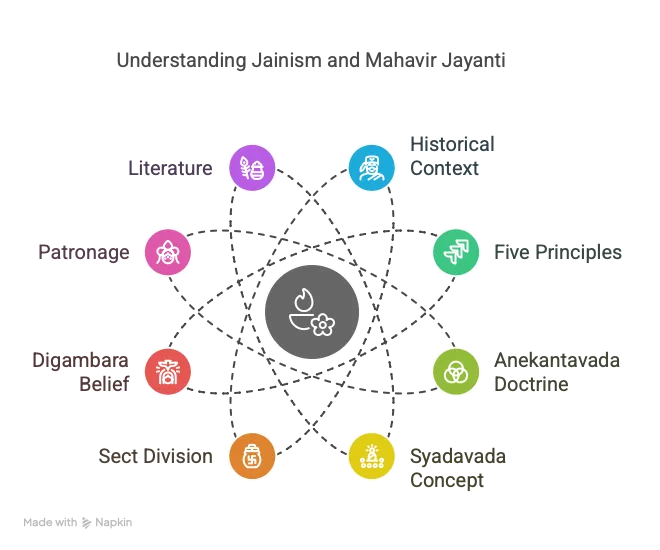UPSC
Exam Nugget
Mahavir Jayanti and Jaina Philosophy
Last Updated
10th April, 2025
Date Published
10th April, 2025
Share This Post With Someone


- Mahavir Jayanti Significance: Celebrated on April 10, 2025, it marks the 2623rd birth anniversary of Lord Mahavir, the 24th and last Tirthankara of Jainism, born in 540 BCE in Kundalagrama, Bihar.
- Historical Context: Mahavir, born to King Siddhartha and Queen Trishala, renounced royal life at 30, attaining enlightenment (Kevala Jnana) after 12 years of penance, shaping Jainism’s core tenets.
- Five Principles: He preached Ahimsa (non-violence), Satya (truth), Asteya (non-stealing), Brahmacharya (chastity), and Aparigraha (non-attachment) as paths to liberation.
- Anekantavada Doctrine: This philosophy highlights the multifaceted nature of reality, asserting that truth is complex and relative, fostering tolerance and diverse perspectives.
- Syadavada Concept: Known as the "doctrine of maybe," it emphasizes conditional judgments, encouraging nuanced understanding over absolute assertions.
- Soul and Karma: Jainism views all souls as equal, inherently divine with infinite knowledge and bliss, bound by karma, which can be shed through ethical living.
- Sect Division: By 300 CE, Jainism split into Digambara (sky-clad, led by Bhadrabahu) and Shvetambara (white-clad, led by Sthulabhadra) sects due to differing practices post a famine.
- Digambara Belief: This sect holds that women must be reborn as men for salvation, reflecting stricter ascetic traditions compared to Shvetambara.
- Patronage: Jainism flourished under rulers like Chandragupta Maurya and Kalinga’s Kharavela (1st century BC), spreading across India, notably in the Deccan.
- Literature: Key texts like Harivamsha Purana (8th century) and Parishishtaparvan (12th century) by Hemachandra provide historical and philosophical insights into Jainism.
Glossary
- Tirthankara: Enlightened teachers in Jainism guiding souls to liberation; Mahavir was the 24th.
- Kevala Jnana: State of omniscience achieved by Mahavir, signifying ultimate knowledge.
- Ahimsa: Principle of non-violence, central to Jain ethical practice.
- Anekantavada: Doctrine of multiple perspectives, promoting intellectual flexibility.
- Digambara: Jain sect advocating nudity for monks as a sign of complete detachment.
Link To The Original Article – https://indianexpress.com/article/upsc-current-affairs/upsc-essentials/knowledge-nugget-mahavir-jayanti-2025-jaina-philosophy-upsc-9934736/